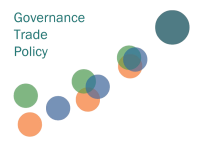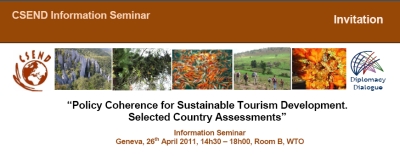TPG - categorys
Hardly a day goes by without the media reporting on the difficult negotiations w i t h i n t h e Wo r l d Trade Organization (WTO) and the threat to international trade should there be no successful conclusion to the Doha Round.
The problem most often reported centers around market access for agricultural products from developing countries that cannot pass the prohibitively high level of tariffs of the industrialized countries.
This policy brief argues that, all too often, the Fund’s use of “conditionalities” for lending has stepped beyond its core legal mandate, particularly causing harm to the least developed countries’ economic development, for example by dictating their trade policies.
The Doha Development Agenda (DDA) launched in 2001was supposed to achieve further trade liberalisation while at the same time taking into account the needs of developing countries. Ten years have passed since its inception. No end of the Round is in sight and the possibility of a full failure looms in the background.
Raymond Saner & Laura Paéz, CSEND policy paper, June 2005.
In 2002, nearly 30 WTO members pledged more than 30 Million Swiss Francs to ensure the achievement of the Doha Development Round (DDR). The pledged amount is meant to finance 514 capacity building actives listed in the WTO Annual Technical Assistance Plan (TAP). In addition, support is to be extended to 49 Least Developed Countries (LDCs) though the Integrated Framework (IF), to help them integrate trade policy into their development strategies. Concerns have arisen as to the scope, effectiveness and efficiency of the TAP and IF. While the activities planned are laudable, the authors question whether they can be achieved and suggest a fundamental reassessment of TAP and IF in order to fulfill the objectives of the DDR.
Teaching input for Executive Course on Global Health Diplomacy, The Global Health Programme, Graduate Institute, Univ. Geneva,
on 20th June 2012, Geneva. Title of Negotiation Simulation was: Negotiating Tobacco Control: Cross Border Advertisement, Promotion and Sponsorship: A Multi-Stakeholder Negotiation Simulation Exercise. Presentation on postmodern diplomacy and schedule of negotiations simulation are listed below
Raymond Saner, Angad Keith & Lichia Yiu
The purpose of this study is to find policy coherence, or lack thereof, in the labour provisions contained in the Free Trade Agreements (FTAs) of the United States of America, the European Union and Australia when compared to their interactions in the Universal Periodic Review (UPR) Sessions with their trade partners and to the official trio of UPR documents made available during these sessions. Over the past decade these countries have entered into various free trade agreements with developing and developed countries alike. However, it is their trade agreements with developing countries that are of particular interest.
The learning architecture which bridges the individual training on trade rules to upgrade trade institutional capacities: Three stages model of CSEND (published in Capacity Development, 2003, Note by the UNCTAD Secretariat, Trade and Development Board (TD/B/50/9, TD/B/WP/168)
Capstone 2010: Trade and Investment for developmen, here
Regional Trade Agreements and Foreign Direct Investment: Impact of existing RTAs on FDI and trade flows in the Andean Community and implications of a hemispheric RTA in the Americas.
Summary Report of Book Vernissage “Inter-Ministerial Coordination and Stakeholder Consultation of Trade Policy Making” - 19th July, 2010 in Room C, WTO
 Through its Trade Policy and Governance Programme (TPGP), CSEND offers a new perspective and a new approach to trade policy governance that enables the recipient countries to better coordinate trade policy between their Ministries and to ensure effective trade policy consultation between the government and their respective economic and social partners.
Through its Trade Policy and Governance Programme (TPGP), CSEND offers a new perspective and a new approach to trade policy governance that enables the recipient countries to better coordinate trade policy between their Ministries and to ensure effective trade policy consultation between the government and their respective economic and social partners.
TPGP aims at improving governance mechanisms of key Ministries and Government Agencies that are responsible for the implementation of trade development mechanisms which have been agreed between industrialized and developing member countries of the WTO and of the International Financial Institutions such as the Enhanced Integrated Framework, Aid-for-Trade, TRTA and PRSP development instruments.
Lessons learnt from more than 20 years of trade capacity building will be made available upon request for DC and LDC governments. The advising and research activities of the CSEND-TPGP team will focus on strengthening LDC and DC governments capacities for inter-ministerial trade policy coordination and government-to-economic/social sector trade policy consultations of its trade, economic and social sector policies at the country level.
CSEND hopes to take TRTA to a next level and to be part of the international community's efforts towards building a new generation of trade development assistance and a new culture in the design, delivery and implementation of development activities directed to the DCs and to the LDCs. Such a reorientation will be ensure that the global trade agenda will indeed put development at the core of its deliberations and actions. Reference is often made of the WTO Doha Round being a development round. May it indeed become a negotiation round where development strategies will included in the global trade agreement which will be useful for the poor and for the least developed countries.

